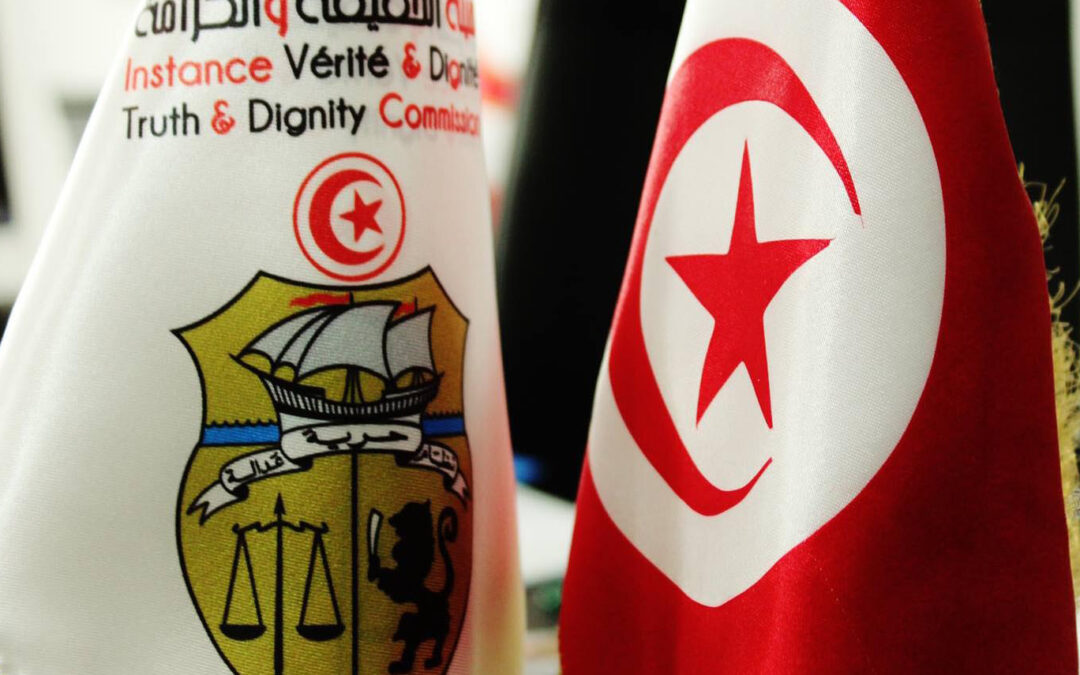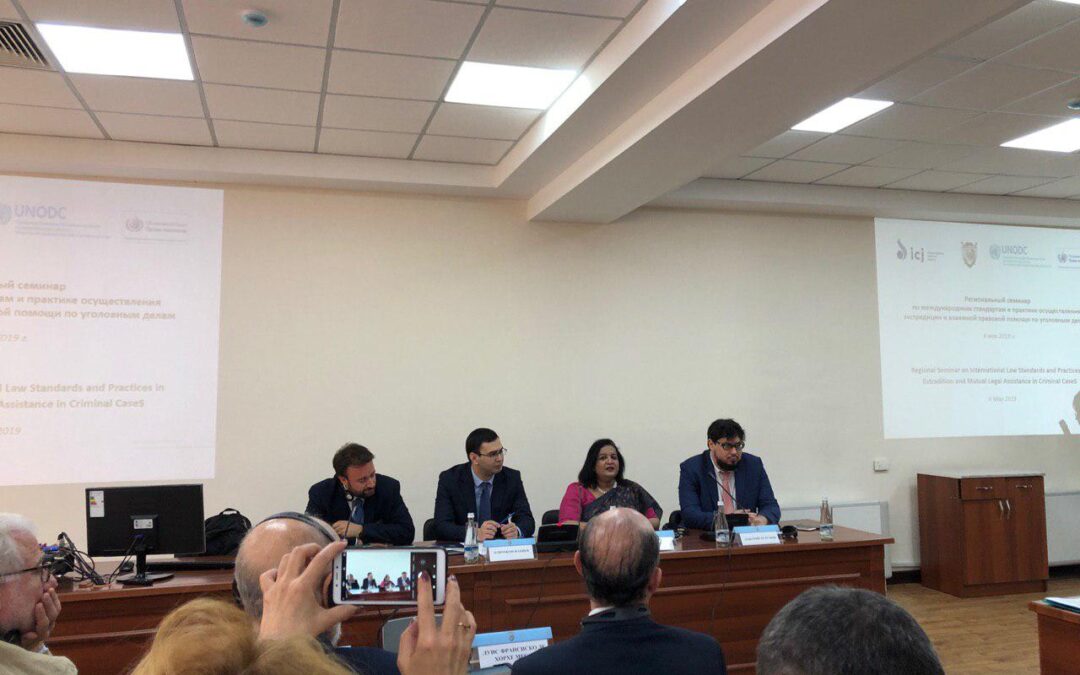
May 6, 2019 | Agendas, Events
Today, the ICJ, together with the General Prosecutor’s Office of Uzbekistan, UNODC and OHCHR are holding the first regional meeting of prosecutors from Central Asia and the Russian Federation to discuss international law and standards in the field of extradition, mutual legal assistance, the rule of law and human rights.
The workshop aims to facilitate exchange of experiences regarding the law and practice of extradition in European and Central Asian countries. Presentations at the workshop will analyse international law and standards on effective criminal justice co-operation and the protection of human rights in extradition, and their application in practice..
The workshop will present cases of mutual cooperation in the field of criminal law from national courts as well as from international mechanisms such as the European Court of Human Rights, the UN Committee against Torture and the UN Human Rights Committee.
The workshop is taking place in Tashkent (Uzbekistan) and is hosted by the Prosecutor General’s Office of Uzbekistan.
More than twenty prosecutors from Kazakhstan, Kyrgyzstan the Russian Federation Tajikistan, Turkmenistan, and Uzbekistan are participating in the event that includes international experts from UNODC, ICJ, including ICJ Commissioner and Emeritus Spanish Supreme Court Justice, José Antonio Martin Pallin, and Italian Prosecutor Lorenzo Salazar.
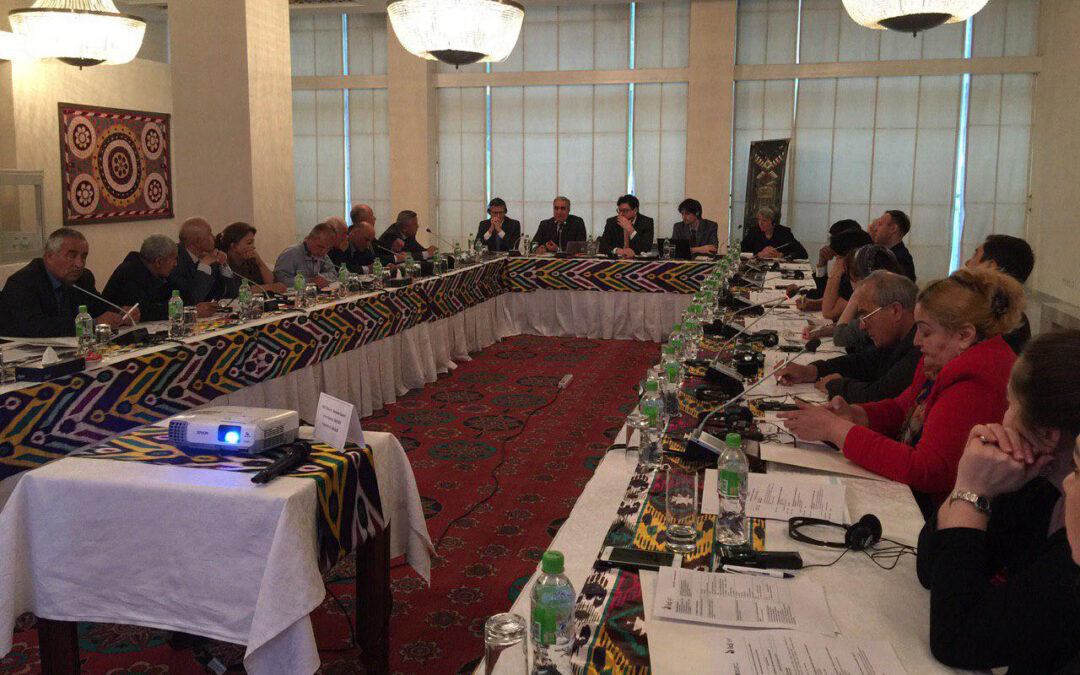
May 4, 2019 | News
The ICJ concluded a research mission on the independence of the judiciary in Tajikistan on 3 May. Following the mission, the ICJ expressed concerns about the independence of individual judges as well as the functioning of judicial institutions and procedures in law and in practice.
The mission included ICJ Commissioner Justice (ret.) Martine Comte of the Orleans Court of Appeal (France) and ICJ Secretary General Saman Zia-Zarifi.
The ICJ spoke with a wide cross-section of stakeholders, including senior government officials, numerous former judges, senior advocates and working lawyers, as well as journalists and members of civil society. The ICJ will provide its findings in a final mission report that will set out include key recommendations to help Tajikistan meet its international obligations.
Among other things, the ICJ mission discussed recent initiatives to reform the judiciary, including the Judicial Reform Programme of 2019-2021 which has been recently been adopted by the President of Tajikistan, and which provides an opportunity to strengthen judicial independence.
The ICJ mission gathered information about the newly formed Qualification Commission for qualification and disciplinary procedures for judges. This replaced the Council of Justice, which had been criticized by international observers for its lack of independence.
Although formally established under the Supreme Court, the Qualification Commission consists predominantly of members of the executive with only two out of seven members being representatives of the judiciary.
Multiple lawyers and former judges expressed serious concerns about the right to a fair trial in criminal proceedings, pointing in particular to the extremely low acquittal rate for suspects. It appears that numbers of acquittals have declined over several decades and that acquittals are now extremely rare.
The ICJ also received complaints that pubic access to court hearings is impeded in practice despite clear legal provision for the public nature of court proceedings, with limited exceptions. Members of the public were said to be generally unable to attend court hearings freely where they are not parties to the proceedings.
Furthermore, the ICJ heard that judicial decisions are generally not available to members of the public unless they are participants in the proceedings.
The ICJ wishes to express its gratitude to everyone who contributed to the successful conduct of the mission, including State, inter-State and non-State organisations and bodies which the ICJ met and communicated with.
The ICJ wishes to stress its appreciation of the support provided by the OSCE Office in Dushanbe and the United Nationals Human Rights Office.
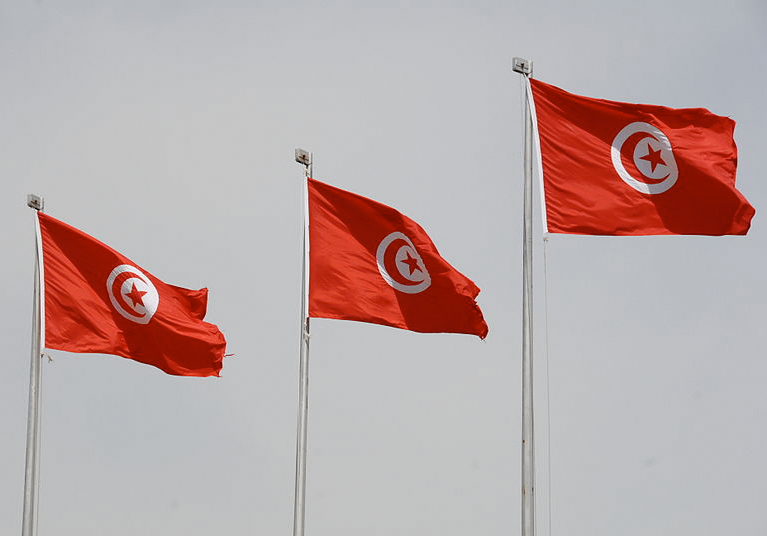
Apr 29, 2019 | News
On 27 and 28 April 2019, the ICJ held a workshop on “Ensuring accountability through the Specialized Criminal Chambers” in coordination with the Association des Magistrats Tunisiens (AMT).
Participants in the workshop included 28 Tunisian judges attached to the Specialized Criminal Chambers (SCC).
The workshop aimed to reinforce the capacity of SCC judges to effectively exercise their role in adjudicating crimes under international law, in line with international law and standards.
ICJ legal advisers and Tunisian experts gave presentations on State the obligations of State actors to respect and apply international law, the legal framework governing the application of international law in Tunisia, and the principle of legality and statutory limitations to crimes under international law. They also spoke on the international and domestic definitions of crimes under international law and modes of liability.
Through working group and plenary sessions, the participants discussed options for applying international law and standards at the national level.
Expert speakers included Judge Brahim Weslati, Judge Radhouane Werthy and Imen Soussi.

Apr 24, 2019 | News
Egypt is hosting an Africa human rights summit meeting beginning April 24, 2019, while its government is presiding over the worst human rights crisis in the country in recent decades.
The 64th Ordinary Session of the African Commission on Human and Peoples’ Rights (ACHPR), the African Union’s top rights body, will take place from April 24 to May 14 in Sharm al-Sheikh.
In addition to its systematic failure to respect and protect human rights at home, Egypt has also led efforts to undermine the Commission’s independence. The Commission should strongly raise Egypt’s human rights abuses at the meeting.
“Egypt is trying to appear like a country open for human rights delegates and summits while, at the same time, crushing all dissenting voices and its once-vibrant human rights community,” said Michael page, Middle East and North Africa director at Human Rights Watch.
“We know that many Egyptian and international organizations are not allowed to work freely in Egypt and cannot voice concerns without severe retaliation from the government,” he added.
The commission should ensure that all government and non-government delegations are able to participate freely in the summit. It should also make clear that it will strongly address any measures of reprisals by the Egyptian authorities against criticism of its practices.
A senior staff member of a leading Egyptian rights organization told Human Rights Watch that only three Egyptian human rights groups were considering participating in the summit because most of the groups were concerned about retaliation by the government.
In recent years, the Egyptian authorities have relentlessly cracked down on non-governmental organizations, issued the 2017 draconian law that effectively bans all independent work by nongovernmental groups, and prosecuted scores of staff workers of Egyptian organizations.
It has also frozen the assets of the most prominent human rights defenders in the country and their organizations and issued travel bans against scores of them.
In April 2018, the government said it would repeal the abusive 2017 NGO law but the government has not made a new draft law public.
The Egyptian authorities have also taken reprisals against human rights defenders and activists for cooperating with regional and international human rights monitors, including United Nations agencies and experts.
In late 2018, Egyptian authorities detained several citizens who met with the UN special rapporteur on adequate housing during her official mission to Egypt, as well as demolishing their houses and banning their travel. The government denied any wrongdoing and accused the UN High commissioner on human rights and other UN officials of breaching UN standards and adopting the “lies” of “terrorist” organizations.
In September 2017, officials stopped Ibrahim Metwally, a lawyer and co-founder of the Associations of the Families of the Disappeared, from traveling for meetings with UN officials in Geneva. Security agencies arrested him at the airport and held him incommunicado for a few days. He is still held in “pretrial detention” for farcical charges.
The Egyptian government has tried to undermine the independence of the Commission through spearheading the adoption of African Union’s Executive Council’s Decision 1015, paragraph 5. The provision, which was passed in June 2018, undermines the Commission’s independence by subjecting its work to control by the African Union member countries.
The Egyptian government has ignored decisions and resolutions the Commission and its experts have made addressing several violations and abuses including the crackdown on civil society, restrictions on freedom of religion, unfair trials and mass death sentences, arbitrary arrests, and sexual violence.
The ACHPR session comes at a time when the Egyptian authorities have been severely oppressing dissent and obliterating any space for peaceful expression or gathering before the public vote held between April 19-22 on highly draconian constitutional amendments that will strengthen the military control of public and political life and further undermine the already weak judicial independence.
Egyptian human rights organization have documented the arrests of over 160 people, often in mass arrests, since February in relation to the ongoing crackdown on dissidents and perceived critics.
These amendments, and several other laws that President Abdel Fattah al-Sisi has approved in recent years, such as new media laws and laws to expand the use of military courts to try civilians, violate international law standards including the African Charter on Human and Peoples’ Rights.
Since al-Sisi secured a second term in elections that were largely neither free nor fair in March 2018, his security forces have escalated a campaign of intimidation, violence, and arbitrary arrests against political opponents, activists, and many others who have voiced even mild criticism of the government.
The Egyptian government and state media have framed this repression under the guise of combating terrorism, and al-Sisi has increasingly invoked terrorism and the country’s state of emergency law to silence peaceful activists.
In July 2013, the African Union Peace and Security Council suspended Egypt’s membership in all African Union activities following the forcible removal of former President Mohamed Morsy by the army, which was led by al-Sisi, then the defense minister. The suspension ended after al-Sisi was elected President in June 2014.
But Egypt has failed to effectively investigate or to hold any official or member of the security forces accountable for the mass killings of protesters in the summer of 2013 despite several national and international calls, including by the ACHPR, and despite incriminating evidence.
In August 2013, Egyptian security forces most likely killed at least 817 people in a few hours during its violent dispersal of the largely peaceful pro-Morsy sit-in in Cairo’s Raba’ Square. The killings likely amounted to crimes against humanity.
“Through such summits, Egypt is trying to whitewash its dire record of abuses,” George Kegoro, executive director of Kenya Human Rights Commission said. “The African human rights commission should take the opportunity of this meeting to vigorously engage the Egypt government on its own actions that threaten the rights, and the very lives, of many Egyptians.”
The co-signing organizations are:
Andalus Institute for Tolerance and Anti-Violence Studies
Belady Center for Rights and Freedoms
Cairo Institute for Human Rights Studies
Committee for Justice|
EuroMed Rights
Egyptian Front for Human Rights
Human Rights Watch
Kenya Human Rights Commission
The Egyptian Commission for Rights and Freedoms
The Freedom Initiative
The International Commission of Jurists
Egypt-African Rights Summit-News-2019-ARA (Press release, PDF, Arabic)
Contact:
Said Benarbia, Director of ICJ’s MENA Programme, t: +41-79-878-35-46 ; e: said.benarbia(a)icj.org
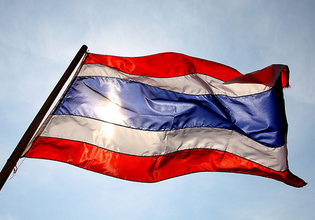
Apr 22, 2019 | Advocacy, News, Non-legal submissions
Today, the ICJ submitted recommendations to the Council of the State calling for the repeal or amendment of National Council for Peace and Order (NCPO) and Head of the NCPO (HNCPO) orders and announcements in line with Thailand’s international human rights law obligations.
The ICJ was informed by the Ministry of Foreign Affairs that the Council of the State had been tasked to review the necessity and relevance of announcements, orders, and acts of the NCPO and of the HNCPO in February 2019.
The review process is in line with Thailand’s declaration to the UN Human Rights Committee in its Follow-Up to the Concluding Observations of the Committee, submitted on 18 July and published on 10 August 2018.
In its submission to the Council of the State, the ICJ has called for the review process of HNCPO and NCPO announcements and orders to be carried out with increased public participation, openness, and transparency.
The ICJ has also made recommendations on the repeal and amendment of the following HNCPO and NCPO orders and announcements since they are clearly inconsistent with Thailand’s international human rights law obligations and the 2017 Constitution, and are neither necessary, nor proportionate, nor relevant to the current situation:
- Orders that provide the military with superior powers beyond civilian authorities;
- Orders that allow military courts to prosecute civilians;
- Orders that infringe on the rights to freedom of expression and assembly, restrict media freedom and the right to information; and
- Orders that infringe on community and environmental rights.
As main priorities, the ICJ has recommended that:
a) the exercising of law enforcement powers by military personnel to arrest and detain suspects in places not formally recognized as places of detention without judicial review should end;
b) all cases of civilians facing proceedings before military courts be transferred to civilian courts, and all civilians convicted of an offence in military courts be guaranteed a re-trial in civilian courts; and
c) all other HNCPO and NCPO orders and announcements should be repealed or amended to bring Thailand in compliance with its international human rights law obligations, and to ensure that the rights to freedom of expression, opinion and assembly, and environmental rights, among others, be respected.
Thailand-civilian prosecutions military courts-Advocacy-Non-legal submissions-2019-ENG (PDF in English)
Thailand-civilian prosecutions military courts-Advocacy-Non-legal submissions-2019-THAI (PDF in Thailand)
Further readings:
Post coup’s legal frameworks
Thailand: ICJ alarmed at increasing use of arbitrary powers under Article 44
Joint submission to the UN Human Rights Committee by the ICJ and Thai Lawyers for Human Rights
The ICJ and other groups made a joint follow-up submission to the UN Human Rights Committee
Thailand: statement to UN on situation for human rights
ICJ and Thai Lawyers for Human RIghts’ submission to the Universal Periodic Review (UPR) of Thailand
Military officers in law enforcement missions
Thailand: immediately end the practice of arbitrarily detaining persons in unofficial places of detention
Thailand: The ICJ and Human Rights Watch express concerns over detentions
The Use of Military Court
Thailand: transfer all civilians to civilian courts
Thailand: End prosecution of civilians in military tribunals
Thailand: ICJ welcomes Order phasing out prosecution of civilians in military courts but government must do much more
Freedom of expression and assembly
Thailand: lifting of the ban on political activities is welcome but more is needed
Thailand: Lift ban on political gatherings and fully reinstate all fundamental freedoms in Thailand
Thailand: misuse of laws restricts fundamental freedoms (UN statement)
Community and environmental rights
“Development” and its discontents in Thailand
Thailand: ICJ submission to the UN Committee on Economic, Social and Cultural Rights




